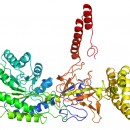DNCON2 - Deep convolutional neural networks for protein contact map prediction (2017) DNCON2
CONFOLD2 - Improved ab initio protein structure reconstruction (2016) CONFOLD2
ConEVA - Toolbox for Assessment of Protein Contacts (2016) ConEVA
DeepQA - Improving the estimation of single protein model quality with deep belief networks (2016) Download DeepQA.tar.gz
UniCon3D - United-residue protein folding via stepwise, probabilistic sampling (2016) Download UniCon3D-1.0.tar.gz
DNSS 1.0 - A Deep Learning Network Approach to ab initio Protein Secondary Structure Prediction (2014) Download DNSS1.0.tar.gz
DNTor 1.0 - A deep learning tool for protein torsion angle prediction.(2016) Download DNTor1.0.tar.gz
Betacon: a software package to predict the beta-sheet topology of a protein. Download betacon.tar.gz
MTMG: A Stochastic Point Cloud Sampling Method for Multi-Template Protein Comparative Modeling. Download MTMG-1.0.tar.gz
CONFOLD 1.0: A tool to build protein 3D models using contacts and secondary structures. Download confold_v1.0.tar.gz
RF-Fold: Protein fold recognition system using Random Forest. Download RF-Fold.tar.gz
SMOQ: a tool for protein single model local quality prediction. Download SMOQ.tar.gz
i3Drefine: a software for reliable and computationally efficient protein structure refinement. Download i3Drefine.tar.gz
APOLLO source code: assessing protein single or multiple model(s). (Evaluating the absolute and/or relative qualities of multiple models or a single model.) Download apollo_source.tar.gz
PSpro 2.0: a software to predict secondary structure, solvent accessibility, and residue-residue contacts . Download PSpro 2.0
PSpro 1.1: a software to predict secondary structure, solvent accessibility, and residue-residue contacts . Download PSpro 1.1
APOLLO (64bit): assessing protein single or multiple model(s). (Evaluating the absolute and/or relative qualities of multiple models or a single model.) Download apollo_pairwise.64bit.tar.gz
APOLLO (32bit): assessing protein single or multiple model(s). (Evaluating the absolute and/or relative qualities of multiple models or a single model.) Download apollo_pairwise.32bit.tar.gz
ModelEvaluator for absoluate quality assessment of a single model. Download model_eva1.0
HMMsato: a novel and practical profile-profile pairwise protein sequence alignment method. Download HMMsato.tar.gz
MSACompro 1.2.0: MSACompro is a novel and practical multiple protein sequence alignment algorithm based on secondary structure, solvent accessibility, and contact map information. This is an updated version of MSACompro 1.1.0. Download MSACompro_1.2.0_v64.tar.gz (for 64-bit Linux) Download MSACompro_1.2.0_v32.tar.gz (for 32-bit Linux)
MSACompro 1.1.0: This is an updated version of MSACompro 1.0.1. Download MSACompro 1.1.0
MSACompro 1.0.1: a novel and practical multiple protein sequence alignment algorithm based on secondary structure, solvent accessibility, and contact map information. Download MSACompro 1.0.1
Neural networks for ordinal regression and classification. Download NNRank and NNClass 1.1
Protein contact map prediction using support vector machines. Download SVMcon 1.0 Ranked among the best methods in CASP7,8,9 (e.g. no. 1 automated method in CASP9).
Protein contact map prediction using neural networks. Download NNcon 1.0 Ranked among the best methods in CASP7, 8 and 9 (e.g. no. 1 automated method in CASP8)
A visual editor for profile hidden Markov model. Download HMMEditor 1.0 (Java code and binary)
Prediction of protein folding rate (Java binary for all platforms). Download SeqRate 1.0
Protein disordered region prediction. Download PreDisorder 1.1 Ranked among the best methods in CASP7, 8 and 9 (e.g. no. 2 automated method in CASP9)
|

